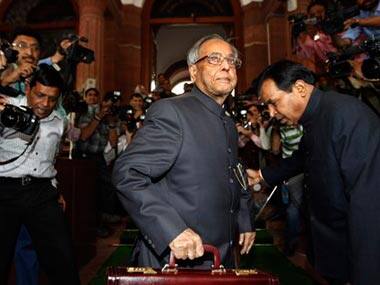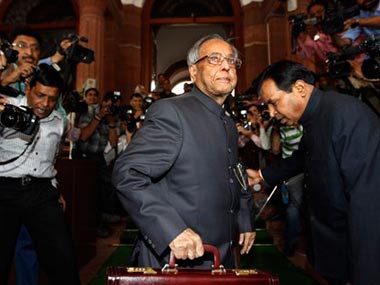Finance Minister Pranab Mukherjee is earning a lot of plaudits from corporate leaders for his “earnestness” and “sincerity” about sticking to his deficit targets in the budget. But not everyone is convinced that Mukherjee’s numbers add up, or that his underlying assumptions while making his projections are well-founded.
In particular, Mukherjee’s assumptions in projecting fiscal deficit target at 5.1 percent for 2012-13 may once again prove a mirage, say economists at foreign banks and independent analysts.
[caption id=“attachment_247274” align=“alignleft” width=“380” caption=“Mukherjee’s assumptions in projecting fiscal deficit target at 5.1 percent for 2012-13 may once again prove a mirage. AP”]
 [/caption]
[/caption]
Mukherjee will almost certainly overshoot the fiscal deficit target of 5.1 percent of GDP, according to economist Jim Walker, founder of Asianomics.
In his estimation, the final figure could be closer to 6 percent, since Mukherjee’s premise of an acceleration in GDP growth relative to last year will be belied. “He is probably going to be disappointed,” says Walker. “I have to say I am quite surprised about how accepting everybody is of the Budget and the fact that there is a more realistic 5.1 percent budget deficit projected for 2012-13.”
Credit Suisse economist Robert Prior-Wandesforde too reasons that we will see a “fairly substantial budget overshoot”. Although the assumptions underpinning Mukherjee’s forecast are more realistic than what they were last year, “we are still looking for another fairly substantial overshoot,” he adds.
Prior-Wandesforde explains the difference as arising from his lower GDP growth expectations of 6.8 per cent for 2011-12 and 7.3 percent for 2012-13; on the other hand, he fears that the government’s disinvestment and subsidy assumptions will prove “optimistic”.
In Walker’s estimation, the skewed assumptions and numbers in Mukherjee’s budget may not warrant an immediate ratings downgrade by sovereign ratings agencies, but nevertheless it will weigh on their minds.
“I don’t think it is negative enough for rating agencies to be downgrading India on the back of the Budget,” say Walker. “But they will be looking very carefully at the actual performance.”
Walker points out that the fiscal consolidation effort has gone nowhere in the past three years “That’s certainly what will be at the back of the rating agencies’ minds, when they start looking again at India over the course of the next six months or so. The Budget itself probably wouldn’t result in a downgrade. But there is no improvement in the fiscal position and there is none projected.”
That, he adds, could result in a downgrade - perhaps not this year, but the next.
Prior-Wandesforde sees the budget as a “depressingly predictable” “good old-fashioned tax and spending plan.” Extensive spending increases will be financed mainly by an increase in the excise and services tax, together with a widening of the services tax net. “Sadly, but not unexpectedly, proposals for radical economic reforms were largely notable by their absence.”
But although the chance for reform may have been passed up, the RBI is unlikely to delay repo rate cuts beginning April, says Prior-Wandesforde. “A tinge of disappointment regarding the budget is… unlikely to delay a monetary easing for too long. Repo rate reductions appear to be heavily dependent on the development of headline wholesale price inflation, which is set to fall,” he adds.
)